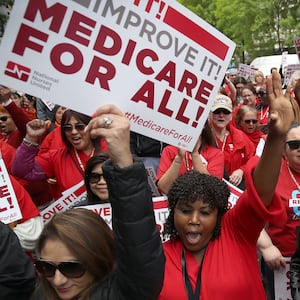J.D. Vance is supposed to be a new kind of “populist” conservative. When Vance won his party’s nomination for Ohio’s open Senate seat on Tuesday, post-liberal writer Sohrab Ahmari enthused that this defeat for the old “Reaganite” consensus proved that “the GOP’s rank-and-file doesn’t share the establishment’s commitments to market fundamentalism and foreign adventurism.”
There’s just one problem with this narrative—J.D. Vance is about as “populist” as Gordon Gekko.
Don’t believe me? Let’s check the receipts.
Vance is against Medicare for All. He’s against universal childcare. He doesn’t even want to raise the minimum wage. These are pretty much the views you’d expect from a Yale-educated venture capitalist whose campaign is primarily financed by a libertarian Silicon Valley billionaire—but they’re an odd fit with his current image.
Vance initially rose to fame in 2016 as the author of a bestselling book (Hillbilly Elegy) that, as Current Affairs editor Nathan J. Robinson put it, might as well have been called, “How I Made It To Yale Even Though My Family Are Drug-Addicted Violent Wastrels Who Should Pull Themselves Up By Their Bootstraps.”
Back then, he was a Romney-ish Never Trumper who wrote in USA Today that “Trump’s actual policy proposals, such as they are, range from immoral to absurd.” He’s since apologized and abased himself to the former president—and was rewarded with Trump’s endorsement in the Ohio Senate race.
A glance through Vance’s campaign website shows that he’s trying very hard to project at least a general impression of populism. The site’s front page vaguely assails “economic and government leaders” who do things that “make life harder for ordinary Americans.” The phrase “poverty rate” shows up in the second sentence of the "Issues" page. There are whole sections devoted to the opioid crisis and the loss of industrial jobs. The phrase “working class” even makes a few appearances.
What’s missing is anything that even looks like a solution to these problems.
The sections on social issues are crystal clear. He says that he wants to ban abortion, for example, and end all funding to universities that “teach Critical Race Theory.” But the sections most central to his “populist” branding are hopelessly vague.
The “Restore America’s Manufacturing Base” section praises former President Donald Trump’s trade policies and vaguely gestures at the idea that something more should be done along the same lines. What exactly? Your guess is as good as mine.
The section on the opioid crisis is even less clear than that. The closest he comes to any policy talk is this sentence: “I’ll work to tackle the drug epidemic, eliminate the drugs coming into our community, and help those devastated by addiction.”
Tackle how? Help how? He doesn’t say.
One thing we know he doesn’t want to do is to help them by offering them free medical care. During a 2019 conversation with Fox News host Tucker Carlson, Vance came up with a creative reason for opposing Medicare for All:
VANCE: Well, at a big level, the Democratic Party increasingly represents professional class elites.
CARLSON: Yes.
VANCE: And Republicans represent middle and working-class wage earners in the middle of the country. Now, I will say, I think Democratic leaders kind of get this. If you look at the big proposals from the 2020 Democratic presidential candidates—universal childcare, debt-free college, even Medicare-for-All—which is framed as this lurch to the left, but is really just a big handout to doctors, physicians, pharmaceutical companies, and hospitals.
In the real world, hospitals and pharmaceutical companies understand perfectly well that Medicare for All would massively decrease their profits. Medicare and Medicaid already pay out at much lower rates than private insurers—and if the government became the “single payer” on which all the sellers of medical goods and services depend, it would have vastly more bargaining power in setting prices. This is one reason why health care tends to take up a much smaller slice of the GDPs in otherwise comparable nations with some form of universal public health care.
Vance’s specialty seems to be coming up with “populist” ways of explaining why he’s opposed to any major reform that would involve redistributing the wealth of people like his billionaire patron Peter Thiel to meet the needs of the working class. Universal childcare, he’s bizarrely claimed, would be “class war against normal people.”
How does that work? He cites a poll that shows people who don’t have college degrees are more likely than those who do to prefer an arrangement where one of them is a stay-at-home parent at least during the early years.
The gap shown by that poll, by the way, is 44 percent to 35 percent—a significant difference, but far less than would be suggested by Vance’s rhetoric about “normal people” not wanting to use childcare. Even so, Vance is right that wanting to stay home with the kids is a perfectly legitimate preference—and a decent society would make this possible.
But what does he actually propose as an alternative to universal childcare? He endorses a child allowance that would be like the expanded Child Tax Credit briefly enacted under President Joe Biden—who, recall, far from being some fire-breathing populist is the guy who the entire Democratic establishment consolidated behind to defeat Sen. Bernie Sanders.
But, of course, Vance prefers Republican Sen. Josh Hawley’s version of the idea, which would “offer smaller smaller payments and under more constrained conditions.”
How about actually increasing wages? Ohio steelworkers of previous generations were able to provide for their families on a single income thanks to the wages and benefits won by powerful industrial unions. That’s why so many Ohioans are so desperate to believe anyone who tells them they can bring those jobs back.
Vance, meanwhile, frets that even proposals to raise the minimum wage to $15 an hour “might force a lot of employers to lay people off.” But don’t worry—he’s a populist.
All of this starts to make a lot more sense when we pull back the camera and look at the guy writing the checks.
Back in 2009, Peter Thiel was one of the purest representatives of the kind of “market fundamentalism” deplored by Sohrab Ahmari you could hope to find. In an essay published on the website of the libertarian-leaning Cato Institute, Thiel openly worried that giving ordinary people too much power is bad for the profits of the elite.
“Since the 1920s,” Thiel wrote, “the vast increase in welfare beneficiaries and the extension of the franchise to women—two constituencies that are notoriously tough for libertarians—have rendered the notion of ‘capitalist democracy’ into an oxymoron.” He recommended exploration of outer space and “seasteading” on the ocean floor as ways he and his fellow libertarians could escape the bad effects of mass democracy.
This year, he donated $15 million to Vance’s super PAC—an unprecedented amount of money for a Senate campaign. This is certainly a dramatic reversal from abandoning earthly politics and hoping to set up anarcho-capitalist colonies underwater or in outer space.
But judging by the way Thiel’s candidate starts talking whenever economic policy conversations get too specific, Thiel’s fundamental antipathy to letting the filthy masses get their hands on his money remains firmly in place.
J.D. Vance is many things. He’s a bestselling author. He’s a venture capitalist. He’s the founder of an “anti-opioid” nonprofit that “spent more than 95 percent of its 2017 fundraising on staff salaries and overhead, and $0 on charitable activities or grants.” One thing he can’t be called with a straight face is a “populist.”







